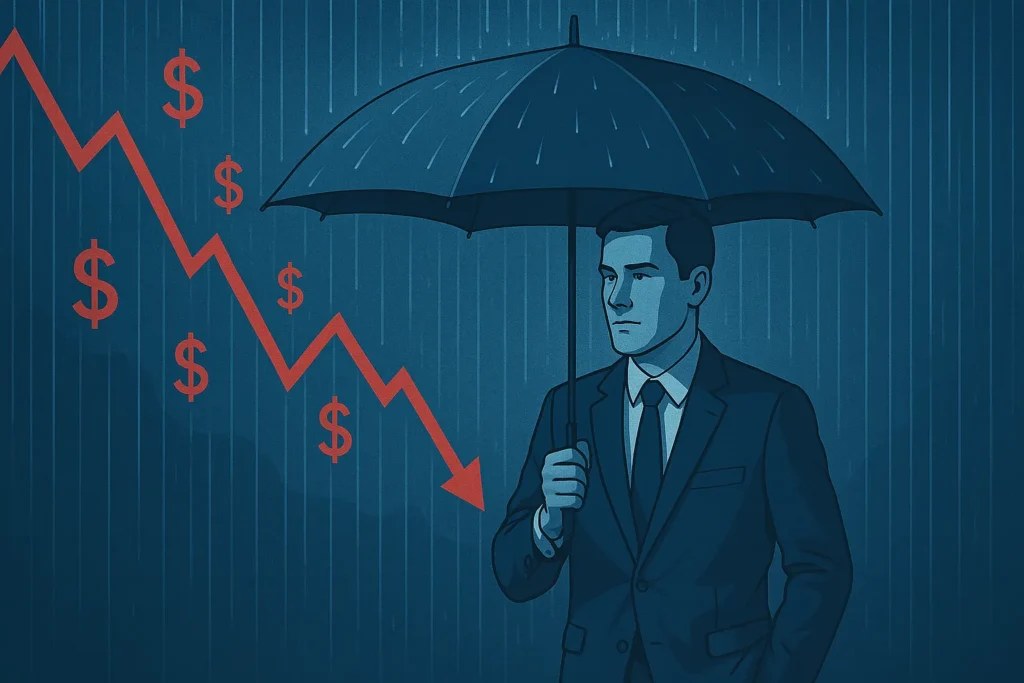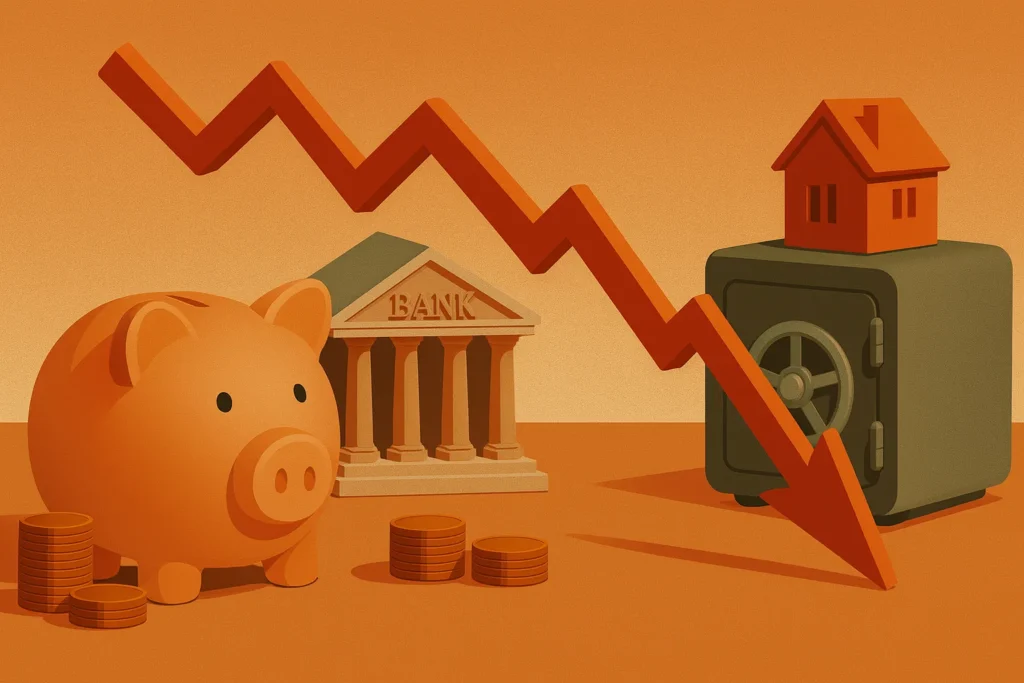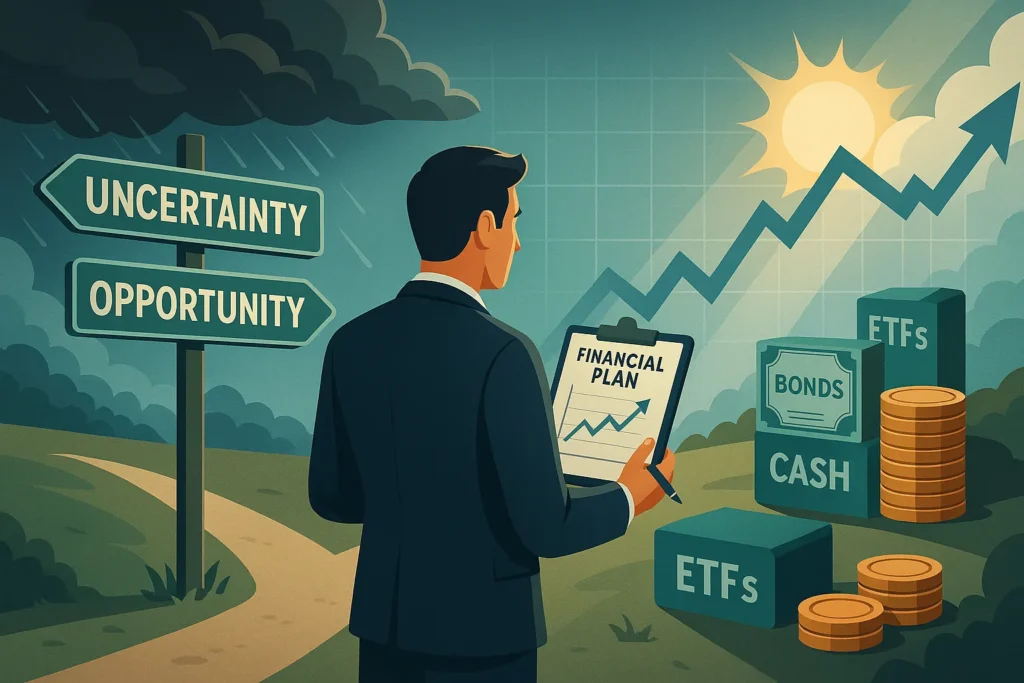When the economy hits the skids, so does confidence. Headlines scream “recession,” markets nosedive, and suddenly your 401(k) feels more like a gamble than a game plan. But here’s the twist—recessions aren’t a red light for your financial future. They’re actually a rare window of opportunity if you know how to invest during a recession with clarity and grit.
Instead of freezing up, this guide will help you move smart. We’ll unpack recession-resilient strategies that don’t just survive economic slumps—they thrive in them. You’ll learn where to put your money, how to avoid emotional decisions, and what habits can quietly build wealth even when the market feels hostile.
And consider this: after every U.S. recession since World War II, the stock market has bounced back—higher and stronger than before. 📎 NBER: U.S. Business Cycle Expansions and Contractions
Whether you’re navigating your first downturn or just tired of feeling uncertain, this is your crash course in how to recession-proof your mindset, your money, and your future.
Let’s get you investing smart—even when the world isn’t.
Why You Should Still Invest During a Recession

Why You Should Stick With Index Funds—Especially During a Recession
First things first—when markets get rocky, it’s tempting to chase the next “safe” stock. But instead of rolling the dice on individual companies, consider this time-tested move: index funds. They’re the unsung heroes of smart investing during a slowdown.
Why? Because index funds spread your money across hundreds of companies. That means you’re not putting all your eggs in one unpredictable basket. Instead, you’re riding the average of the market—slow, steady, and surprisingly strong over the long term.
📎 Vanguard: Why Index Funds Make Sense
Moreover, index funds are low-fee, passive, and hands-off. You’re not trying to outsmart the market during a downturn—which, frankly, even the pros often fail to do. You’re simply choosing a recession-proof investment that mirrors market performance without the anxiety.
For example, the S&P 500 index has historically rebounded from every economic slump. While there are no guarantees, its long-term trajectory has been upward—even after brutal recessions.
So, if you’re wondering how to weather a downturn with investments, this is your power move: skip the speculation, and lean into broad-market index funds. They’re simple, effective, and built for the long haul.
📎 Investopedia: S&P 500 average annual return since 1957 – about 10%
The Costly Mistake of Timing the Market During a Recession—and What to Do Instead
It sounds simple enough: buy low, sell high. But in reality, trying to “time the market” is one of the most common and costly mistakes—especially during economic slumps. In fact, even seasoned investors often miss the mark. Instead of playing the guessing game, your energy is better spent on recession investment strategies that prioritize consistency over prediction.
For instance, when panic sets in, it’s easy to think, “I’ll sell now and re-enter when things calm down.” But here’s the problem: by the time markets stabilize, the biggest gains have often already happened. According to research from JPMorgan, missing just the 10 best days in the market over a 20-year span can drastically cut your returns.
📎 J.P. Morgan: Staying fully invested yields ~10.6% vs ~6.4% if you miss the 10 best days
Furthermore, during investing amid recession, emotions tend to drive decisions. Fear causes people to sell at lows and buy at highs—completely backwards. Instead, stick to a long-term plan and consider using dollar-cost averaging to smooth out volatility.
Simply put, smart money moves in a downturn don’t require perfect timing—they require staying invested. Trying to predict market swings may feel proactive, but more often, it’s just expensive guesswork.
📎 Charles Schwab: Does Market Timing Work?
How to Recession-Proof Your Portfolio

Why Defensive Stocks Belong in Your Recession Investment Strategy
When the economy shrinks and consumer confidence wobbles, some stocks manage to hold their ground. These are called defensive stocks—companies that sell essentials like food, utilities, or healthcare. Regardless of what’s happening in the market, people still buy groceries, take medications, and pay their electric bills. That’s why adding these to your portfolio is a cornerstone of crisis investing strategies.
Moreover, defensive stocks don’t just offer stability—they often pay dividends. So even if the share price dips slightly, you’re still getting paid. That’s a win-win in uncertain times. Plus, they typically have lower volatility, which helps smooth the rollercoaster effect of broader downturns.
For example, Procter & Gamble or Johnson & Johnson may not double overnight, but they’ve historically performed well in recessions. These companies offer products people can’t live without—and that’s powerful insulation against market chaos.
So if you’re looking to grow money in a downturn while sleeping soundly at night, start here. Defensive stocks aren’t flashy, but in a recession, boring is beautiful.
📎 Morningstar: Best Defensive Stocks
The Power of Cash Reserves: A Safety Net for Investing in Tough Times
Here’s the truth: cash is underrated. When markets sink and job uncertainty rises, having cash on hand is more than a safety net—it’s a strategic asset. It gives you the flexibility to make smart choices, rather than emotional ones, which is crucial in navigating investing in a slowdown.
First off, cash keeps you liquid. That means you won’t need to sell investments at a loss just to pay bills. More importantly, cash lets you take advantage of opportunities—like snapping up undervalued assets—when everyone else is too strapped to act.
That said, balance is key. You don’t want too much cash sitting idle, losing value to inflation. But 3–6 months of expenses in a high-yield savings account can shield you from financial whiplash and support recession investment ideas that pop up at just the right moment.
So yes, keeping a solid cash reserve might feel boring, but it’s actually bold. It gives you options when others have none—and that’s the definition of smart investing in a downturn.
📎 CFPB: How to Build an Emergency Fund
Set It and Grow: Automate Investments to Weather a Downturn with Confidence
Let’s be real—timing your next move in a recession can be mentally exhausting. That’s why automation is your secret weapon. By setting up recurring contributions to your investment accounts, you remove emotion from the equation and embrace wealth building during a downturn.
Here’s how it works: with dollar-cost averaging, you invest the same amount regularly, no matter what the market’s doing. This approach helps you buy more shares when prices are low and fewer when prices are high—automatically optimizing your entries without any guesswork.
Furthermore, automation builds discipline. Instead of stressing over “when to buy,” you just stay consistent. Over time, that consistency compounds. And in the long run, it’s often better to invest smart in a recession than to wait for perfect conditions.
Tools like Betterment or Fidelity make it easy to schedule deposits into diversified portfolios. Once it’s set, you’re good to go—no stress, no second-guessing.
So if you’re aiming for a simple, effective way to invest during uncertainty, automation isn’t just convenient—it’s clutch.
📎 NerdWallet: How to Automate Your Investments
Smart Moves for First-Time Investors

Why Starting with a Robo-Advisor Is a Smart Move in a Downturn
If you’re new to investing—or just overwhelmed by the current economic chaos—a robo-advisor might be the ideal launchpad. These digital platforms use algorithms to create diversified portfolios based on your risk tolerance and goals, making them a perfect tool for investing through an economic slump.
To begin with, robo-advisors take the guesswork out of the equation. You don’t need to worry about picking the right stocks or reading the market’s mood. Instead, your money is automatically allocated across recession-resilient assets like bonds, ETFs, and low-risk investments in crisis.
📎 Investopedia: Robo-advisors build and manage portfolios using index ETFs automatically
Even better? Most robo-advisors are low-cost, and some even offer tax-loss harvesting—a way to offset your investment losses against taxable gains. That’s a bonus when the market isn’t playing nice.
Plus, during downturns, robo-advisors help you stick to the plan. They reallocate as needed and keep your portfolio balanced, so you’re not derailed by fear or hype.
Ultimately, for anyone wondering where to begin or how to stay steady in volatility, robo-advisors offer simplicity, structure, and surprisingly solid returns.
📎 World Bank: Robo-advisors expand access to automated, low-cost investing
The Risk of Chasing Recession-Proof Fads—and What to Do Instead
It’s tempting, isn’t it? Every time the economy shakes, a new “recession-proof” trend pops up—gold, crypto, NFTs, even obscure penny stocks. But before you dive in, let’s break this down: most of these are hype-fueled traps, not stable investments during slowdown.
📎Crypto Investing: Is It Worth the Risk?
Of course, some assets like gold or real estate might hold value, but that doesn’t mean they’re guaranteed wins. What worked in one downturn may flop in the next. And unfortunately, many investors jump into these fads hoping for quick wins, only to lose money—or worse, confidence.
Additionally, chasing trends often pulls you away from a long-term plan. You end up reactive, not strategic. Instead, focus on resilient investment options like index funds, defensive stocks, or diversified ETFs. These may not be flashy, but they’re far more likely to weather the storm.
In short, following the crowd rarely ends well. A better bet? Tune out the noise, trust the fundamentals, and build a portfolio designed to last beyond the next headline.
📎 Fidelity: Guide to Diversification and Asset Allocation
Budgeting Helps You Invest During a Recession

How to Build a Lean Budget and Keep Investing During a Recession
When your income feels shaky and expenses start piling up, the idea of investing can feel out of reach. But with a few smart adjustments, you can still invest in economic uncertainty—and it starts with building a lean, intentional budget.
First, identify your “must-haves” versus your “nice-to-haves.” Essentials like housing, groceries, and healthcare take priority. Everything else—streaming subscriptions, luxury takeout, random Amazon hauls—should be evaluated ruthlessly. That doesn’t mean you can’t enjoy your money. It means you’re choosing what matters most right now.
📎 LFCU: Budgeting for a Recession — review income, cut nonessentials, and make room for savings
Next, automate your investments—even if it’s just a small amount. This turns saving into a habit rather than a decision you have to make every month. It also reinforces the idea that you can still participate in financial moves in a recession without compromising your stability.
Additionally, review your spending every month. You’ll spot leaks you didn’t even realize existed—and free up funds for your future. Budgeting isn’t about deprivation; it’s about direction.
A lean budget isn’t just a survival tool—it’s a growth engine. When done right, it helps you stay on track, even when the economy isn’t.
📎 Nasdaq: Automating your investment plan builds wealth and removes emotion
Track Every Dollar to Make Room for Investing in Tough Times
When money feels tight, it might seem like there’s nothing left to invest. But often, the issue isn’t income—it’s visibility. That’s where tracking every dollar comes in. By closely monitoring where your money actually goes, you’ll uncover opportunities to reallocate toward smart investing during a slowdown.
Start by reviewing your last 60 days of expenses. Categorize every transaction. You’ll likely be surprised by recurring charges, unnecessary purchases, or habits that quietly drain your cash flow. Cancel what’s not essential, renegotiate bills, and trim the fluff.
📎 Medium: Tracking every dollar daily uncovers hidden spending that drains your budget
Next, reroute those savings. Even if it’s just $25 a week, automating a contribution toward solid bets in a downturn like diversified ETFs or a high-yield savings account creates momentum. It’s not about the amount—it’s about building the behavior.
Additionally, consider tools like YNAB or Monarch Money to help visualize your spending patterns and track progress in real time. Seeing the numbers laid out clearly makes it easier to prioritize.
Remember, budgeting isn’t just about cutting back—it’s about creating space for progress. And in a recession, that space is where your financial resilience grows.
📎 TechRadar: You Need a Budget (YNAB) top-rated for real-time tracking and zero-based budgeting
Everyday Habits That Support Wealth Building

How Investing Your Raises Can Boost Wealth During a Recession
A pay raise feels like permission to upgrade—nicer dinners, newer gadgets, maybe even a slightly pricier apartment. But if you’re serious about smart investing during slowdown, there’s a better way: invest the raise instead of spending it.
Here’s why it works. First, you’re not used to that extra income yet, so redirecting it into your portfolio is virtually painless. You avoid lifestyle inflation and fuel long-term growth—two wins for the price of none.
📎 Forbes: The behavioral finance hack—invest part of your raise into retirement
Even a modest 3–5% increase funneled into recession-proof investments like index funds or diversified ETFs can snowball over time, especially when the market is down. Essentially, you’re buying into assets at a discount when others are backing away.
Furthermore, this tactic keeps you on offense, not defense. Rather than reacting to economic uncertainty, you’re actively building your future wealth—something few people think to do during a downturn.
So next time you get a bump in pay, pause before upgrading your expenses. Direct it toward your financial future. This tiny habit can quietly transform how you grow money in a downturn, without changing your lifestyle.
📎 Reuters: Behavioral finance shows small, consistent contributions can outperform market timing
The Hidden Cost of Emotional Investing in a Downturn—and How to Avoid It
Markets fall. Fear rises. And suddenly, your logical brain checks out while your panic brain takes the wheel. Welcome to emotional investing—a silent portfolio killer during any economic slump.
To begin with, investing based on fear or hype usually means buying high and selling low. That’s the exact opposite of wealth-building. In fact, one of the most damaging behaviors during recession investing is selling off quality assets simply because the headlines are grim.
📎 Allworth Financial: Fear and greed drive poor timing, derailing long-term goals
Additionally, emotional decisions compound over time. You might sell in a panic, wait too long to get back in, and then miss the recovery rally—locking in losses that could’ve been avoided.
Instead, set rules before emotions take over. Automate contributions. Stick to diversified holdings. Revisit your long-term goals. These are the anchors that protect you from stormy market conditions.
Above all, recognize the impulse, but don’t obey it. Emotional investing feels active—but it’s rarely effective. Staying steady, even when the world feels shaky, is what separates seasoned investors from the panicked majority.
📎 CFPB: Emotional Triggers That Derail Financial Decisions
Stay the Course When Investing During a Recession

Why Rechecking Your Investment Plan Quarterly Matters in a Recession
Just because you’re staying the course doesn’t mean you should ignore your investments. In fact, checking in—without overreacting—is a key habit in any recession investment strategy.
Every quarter, carve out 30 minutes to look at your portfolio. Are you still on track toward your goals? Have your risk tolerance or life circumstances changed? If not, you likely don’t need to make changes. But the habit of reviewing builds confidence and keeps you grounded.
This is especially important during downturns. Emotions run high, and it’s easy to forget that investing is a long game. By reviewing your plan regularly, you turn stress into strategy and manage investments in a recession without falling into panic-mode decisions.
Additionally, quarterly check-ins allow you to re-balance if needed. Maybe your bond allocation drifted too low, or one sector over-performed. A simple re-balance keeps your portfolio aligned and intentional.
So don’t wait for a market crash or personal crisis to revisit your strategy. Make it a routine. Because clarity, not constant action, is what drives smart investing.
📎 Morningstar: Portfolio Rebalancing Explained
Focus on Long-Term Goals to Succeed at Investing in a Downturn
Recessions can cloud your vision. It’s easy to fixate on weekly losses and forget the bigger picture. But successful recession investing demands a mindset shift—from short-term panic to long-term purpose.
Instead of obsessing over market dips, revisit why you’re investing in the first place. Are you building retirement savings? Funding your child’s education? Creating generational wealth? Whatever your goal, anchoring your strategy to it helps override short-term fear.
Additionally, research shows that investors with clearly defined goals are more likely to stay invested, even during turbulent periods. It gives your strategy meaning, and meaning builds discipline.
So rather than constantly checking your portfolio, check in with your future. Visualize it. Remind yourself that investing tactics for a downturn are most powerful when rooted in purpose, not panic.
Final Takeaway

How to Invest During a Recession with Confidence and Clarity
Recessions test more than just your finances—they challenge your mindset. But learning how to invest smart in a recession isn’t about predicting the market. It’s about staying consistent, strategic, and calm when it counts.
You’ve seen how small, steady actions—like sticking with index funds, automating contributions, or building a lean budget—can have major impact. These aren’t just recession survival tips; they’re wealth-building strategies that hold up when the market wobbles.
Furthermore, daily habits like tracking spending or revisiting your plan quarterly keep you grounded. They shift your focus from fear to progress.
So even if the economy slows, your momentum doesn’t have to. Stay invested. Stay intentional. Because investing amid recession isn’t about avoiding risk—it’s about managing it with purpose and clarity.
📎 Keep your momentum going—read more on the Investillect blog.
📚 Further Reading: Books to Strengthen Your Recession Strategy
Want to go deeper? These expert-backed books offer timeless insights on how to invest smartly, especially when the market gets tough:
📎 The Intelligent Investor by Benjamin Graham
The definitive guide to value investing and staying rational when markets turn volatile.
📎 Unshakeable by Tony Robbins
Simple, powerful advice to help you stay calm and confident through financial storms.
📎 The Psychology of Money by Morgan Housel
Essential reading on how mindset and behavior shape long-term investing success—especially during downturns.

